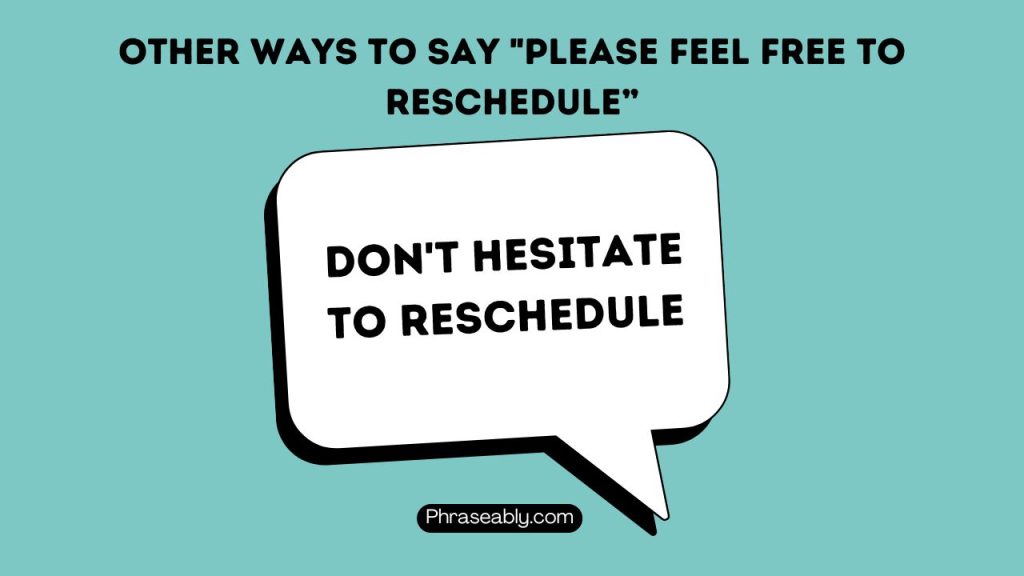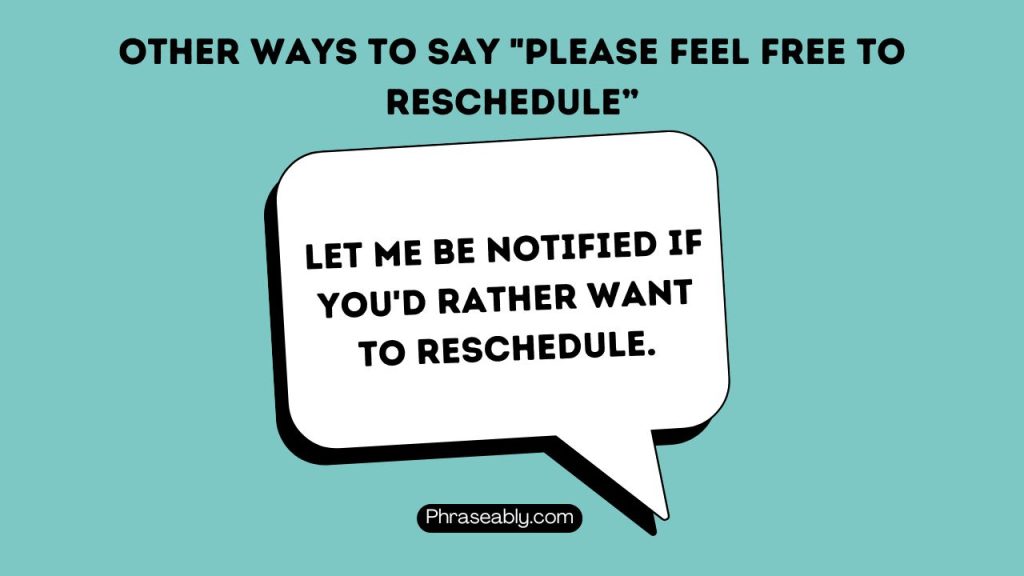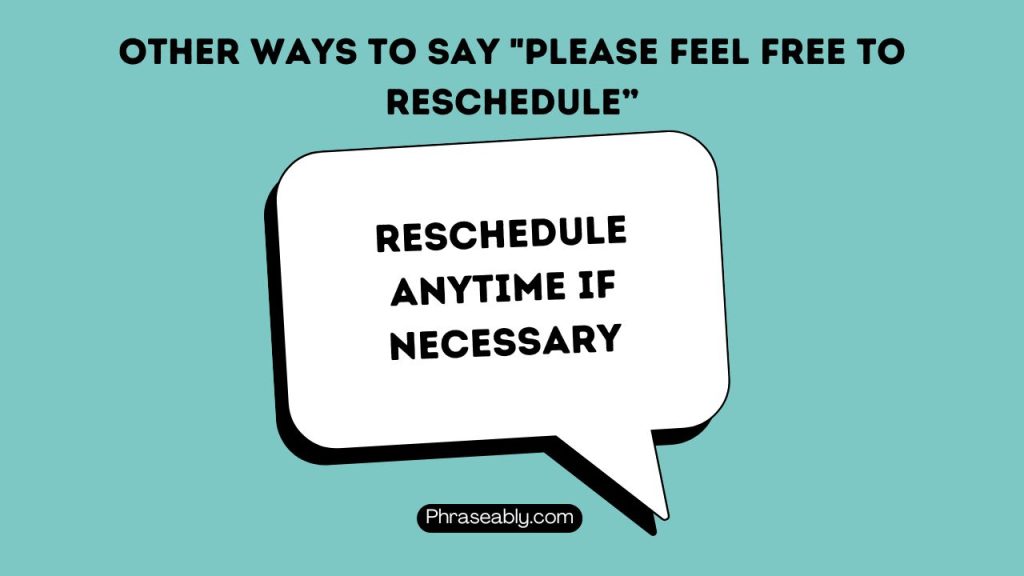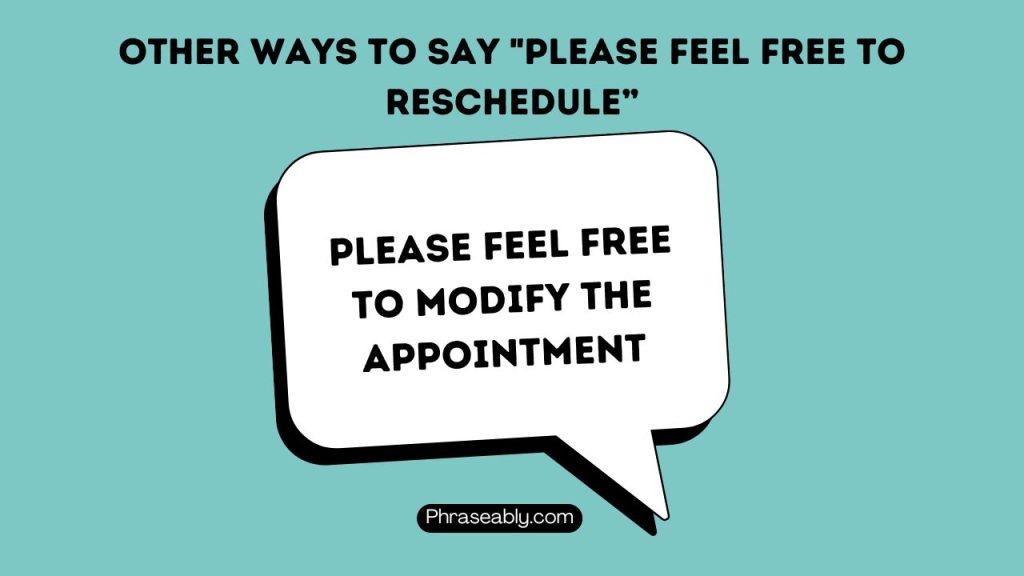“Feel free to change the appointment,” “You can adjust the timing if needed” amongst others are various ways to notify someone that he or she has the liberty to make changes to the time or plans you have scheduled with them.
It shows that you’re willing to be flexible and to work with the schedule most convenient for the other party.
Whether in a formal or an informal setting, these 20 alternative phrases outlined and explained in this article will help you figure out other ways to say that someone is permitted to make changes to the schedule.
With the illustrations provided on how to make use of each phrase in a sentence, it would be easier to put it to good use.
Substitute Ways to Say “Please Feel Free to Reschedule”
- Don’t hesitate to reschedule.
- You’re welcome to reschedule anytime.
- Feel free to change the appointment.
- You can reschedule at your convenience.
- Let me know if you’d rather want to reschedule.
- Please feel free to move the appointment.
- There is no problem if you want a reschedule.
- Feel free to pick a new time.
- It’s no problem to reschedule if needed.
- Reschedule anytime if necessary.
- Let me know if you need to adjust the schedule.
- If you’d prefer a different time, feel free to reschedule.
- Please feel free to shift the appointment.
- You can adjust the timing if needed.
- You are free to set a time that suits you best.
- Rescheduling is perfectly fine, just let me know.
- If the timing doesn’t work, feel free to reschedule.
- Hit me up if a change of time needs to be done
- No problem if you need to reschedule.
- Please feel free to modify the appointment.
Don’t hesitate to reschedule.

When you want to reschedule a meeting, you can say this phrase as it encourages the person not to feel reluctant or uncertain about rescheduling.
You are passing the message that rescheduling is an acceptable option and removes any sense of burden or inconvenience in doing so.
Illustration:
- Don’t hesitate to reschedule the meeting if you’re not comfortable with the time.
- Please don’t hesitate to reschedule the meeting to fit a convenient time.
You’re welcome to reschedule anytime.
What this phrase does is add a warm and open tone, suggesting that the person is completely welcome to change the appointment whenever they see fit.
The word “welcome” reassures them that their request will be well-received. This is a suitable expression for any formal and informal settings depending on the context you’re in.
Illustration:
- You’re welcome to reschedule any time of the day if you want.
- Don’t worry about it, you’re welcome to reschedule anytime.
Feel free to change the appointment.
Make this statement when you’re trying to give permission to someone to reschedule a meeting. The phrase is a simple and direct invitation to alter the appointment.
“Feel free” expresses that there are no restrictions or problems with making changes, permitting the person to adjust the schedule as needed.
Illustration:
- Feel free to change the appointment of the meeting we initially scheduled.
- I would like you to be informed to feel free to change the appointment at any time you want.
You can reschedule at your convenience.
If you want the individual to shift the time of the meeting or appointment to a time more convenient to them.
This is a reassuring phrase to the person that they can change the appointment based on what works best for them.
It means that the other party is mouldable and willing to accommodate their needs.
Illustration:
- You can reschedule at your convenience Mr James, it’s not a problem at all.
- There’s no need to be pressured, you can reschedule at your convenience.
Let me know if you’d rather want to reschedule.

Let’s say you would like to put the control in the hands of the person as to when to book an appointment, this would be a good phrase to use.
It’s a polite offer to reschedule if they would prefer a different time, making it clear that their preference will be respected without pushing them to change unless they want to.
Illustration:
- I know that you might have a busy work schedule so I just want to be notified if you’d rather want to reschedule.
- Let me know if you’d rather want to reschedule, I will not have a problem with that.
Please feel free to move the appointment.
Similar to “please feel free to reschedule,” this phrase uses the word “move” to describe changing the time or date of the appointment.
It’s another way to communicate that shifting the schedule is not a problem and can be done easily.
Illustration:
- Please feel free to move the appointment for the interview, we want you to be convenient with the time.
- Always remember that you are free to move the appointment time for the interview.
There is no problem if you want a reschedule.
In addition, this phrase is particularly workable, stretching the point that the person can reschedule if they need to.
It expresses openness without putting any pressure on them, which means that a change can be made as soon as they express the need.
Illustration:
- There is no problem if you want a reschedule, just let me know so that I can put it in my calendar.
- The time of the event can be shifted. There is no problem if you want a reschedule.
Feel free to pick a new time.
“Feel free to pick a new time” is another phrase that puts more focus on choosing a new time, making it clear that the person can select an alternative slot that works better for them.
It shows leniency in scheduling and a willingness to accommodate different options. How can the phrase be made use of? The answer to that is down below.
Illustration:
- Feel free to pick a new time if you’re not convenient with the time of the interview.
- There’s room for changes with the timing, feel free to pick a new time.
It’s no problem to reschedule if needed.
Reassurance is very vital and that is what this phrase provides in terms of making changes to appointments.
It reassures the person that the process will be easy and handled without any difficulties, allowing them to feel comfortable making changes and indicating that rescheduling is not an inconvenience.
Illustration:
- It’s no problem to reschedule if needed, we don’t operate as a rigid system in our company.
- There’s no problem to reschedule if needed, I just wanted to point that out.
Reschedule anytime if necessary.

If you aim to allow the person to reschedule at whatever time pleases them, then this phrase would be helpful to you. You’re giving them the freedom to adjust the appointment at any time, without restrictions, whenever they find it necessary.
Illustration:
- I was informed that I could reschedule anytime if necessary, thank you so much.
- Reschedule anytime if necessary, I know how busy your work is.
Let me know if you need to adjust the schedule.
If you’re looking for a phrase that you could add perhaps to the latter part of an email about rescheduling a meeting, you can choose this expression.
You’re inviting the person to communicate if they feel the need to change the schedule. The openness is significant to making adjustments, implying that changes can be made without issue.
Illustration:
- The timing of the two countries is different so let me know if you need to adjust the schedule.
- If you’re not happy with the schedule, it’s not a problem, let me know if you need to adjust the schedule.
If you’d prefer a different time, feel free to reschedule.
The person’s preference is prioritized in this expression, suggesting that they can reschedule if a different time works better for them. In this case, you’re empowering the individual to choose a time that’s more convenient for them without any pressure.
Illustration:
- If you’d prefer a different time, feel free to reschedule, I just need to know about it and that’s all.
- Times have been set but if you’d prefer a different time, feel free to reschedule.
Please feel free to shift the appointment.
This uses the term “shift” to indicate a change in the appointment time or date. What you’re saying, using this phrase, is that the person can modify the appointment freely, offering them control over the scheduling.
Illustration:
- Please feel free to shift the appointment for the cake tasting since you are so busy.
- I can’t put you under more stress with a rigid schedule, so please feel free to shift the appointment.
You can adjust the timing if needed.
“You can adjust the timing if needed” also passes the message that someone can make changes to the schedule. The timing aspect suggests that the person can adjust the specific time of the appointment to better suit their needs.
Illustration:
- I can understand that in case of an emergency, you might not be available, that is why I’m telling you that you can adjust the timing if needed.
- You can adjust the timing if needed, Miss Florence.
You are free to set a time that suits you best
Another way to signify open arms to change the schedule of an already set meeting or day is by saying it through these words. It’s an open-ended invitation to reschedule the meeting or event to a time that suits them better.
Illustration:
- You are free to set a time that suits you best
- I don’t want you to be overwhelmed at all, choose another time.
Rescheduling is perfectly fine, just let me know.
Using this phrase directly reassures the person that rescheduling is no problem and can be done easily. It sheds light on the fact that changing the schedule is acceptable, removing any sense of inconvenience.
Illustration:
- Rescheduling is perfectly fine, just let me know and I will keep it noted over at the end.
- I would like to inform you that rescheduling is perfectly fine, just let me know.
If the timing doesn’t work, feel free to reschedule.
Depending on the practicality of the situation—if the scheduled time isn’t suitable, the person can freely reschedule. It means that the current time is not rigid and can be adjusted based on their availability.
Illustration:
- If the timing doesn’t work, feel free to reschedule and keep me posted on whatever decision you make.
- I don’t mean to bother you, If the timing doesn’t work, feel free to reschedule.
Hit me up if a change of time needs to be made.
This is a simple and direct way of inviting the person to change the appointment time. The decision is now in their hands and reassures them that changing the time is an option. The illustration below shows how this phrase can be included in a sentence like a professional.
Illustration:
- Let me know if you’d like to change the time or the location of the venue, it’s fine with me.
- All I want is for you to let me know if you’d like to change the time.
No problem if you need to reschedule.
Similarly, this indicates that there is no issue or inconvenience if the person needs to reschedule. You can use this phrase to revalidate to them that rescheduling is a smooth, accepted process without complications.
Illustration:
- No problem if you need to reschedule. So what time is most suitable for you?
- No problem if you need to reschedule the plans we had today.
Please feel free to modify the appointment.

Introducing the idea of modification implies that the person can make changes to the appointment as needed. With this phrase, you can communicate that a provision to either change the time, date, or any other aspect of the meeting to suit their needs, is available.
Illustration:
- Please feel free to modify the appointment to what works for you.
- I don’t mind if you modify the appointment, please feel free to do so.

